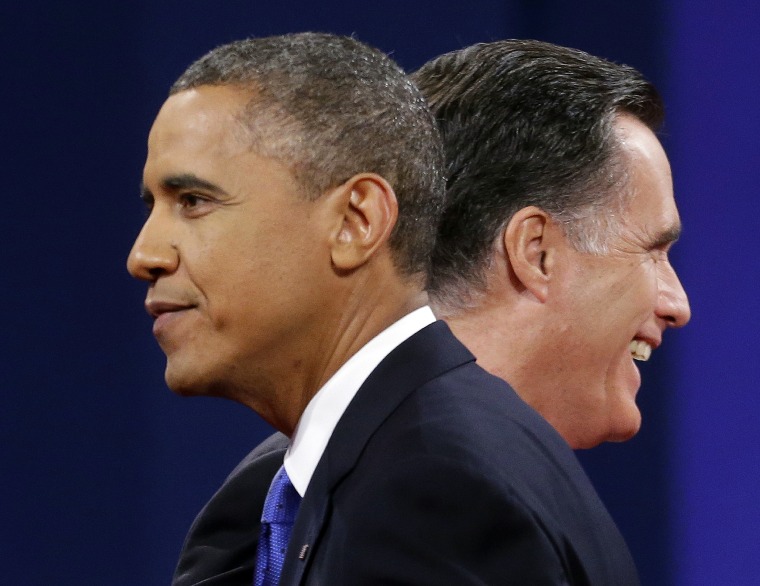A CNN/ORC poll of Ohio likely voters taken from Tuesday through Thursday gave President Obama a four-point lead over Mitt Romney. And that was just one of several Ohio polls last week.
And the reason pollsters are obsessively polling Ohio, the reason that political reporters have flooded the state and that both Barack Obama and Mitt Romney have practically been living there the last few weeks is that it is most likely to be the state that decides the election.
Put simply, even if Mitt Romney wins a number of states Barack Obama won last time - Florida, Virginia and Colorado -- it's still exceedingly difficult for him to get to the needed 270 electoral votes without winning Ohio.
And if there has been a lone point of comfort for Obama supporters over the last few weeks, as the national polls have tightened to tie, or even a slight lead for Mitt Romney, it's that in Ohio, polls reliably show Mitt Romney between 2 and 5 points behind the President.
Political observers have been spending a fair amount of time trying to figure out why it is that Barack Obama is outperforming his national numbers in Ohio, particularly among white men. The most obvious reason is that the Ohio economy is outperforming the national economy. Not only does Ohio have a lower unemployment rate than the nation at large, but it's also seen a faster rate of improvement.
And a big reason for that economic performance is, of course, the auto rescue initiated under the Bush administration and remarkably well executed by the Obama team. There are more than 800,000 people who have jobs in or connected to the auto industry in Ohio, and an estimated 160,000 of them wouldn't have them if the government hadn't stepped in with loans to keep GM and Chrysler alive.
That is the reason that the Obama campaign invokes the auto rescue so often, the reason that it comprised one half of Joe Biden's famous two-line campaign slogan for re-election and it's why Mitt Romeny has spun his wheels furiously to try to race away from the position he held at the time of the financial crisis, which was to let the auto industry go through the wrenching, destructive process of what is known in the business as a''free-fall" bankruptcy.
Now, I supported the auto-rescue at the time and I think it's been well handled on the whole by the Obama administration. But there's something more than a little bizarre about the fact that, after a first term in which the president helped double clean energy generation, ended the war in Iraq, passed landmark financial regulatory reform and a healthcare bill that is the most significant piece of social legislation in almost 50 years, a bill that gives each American guaranteed access to health insurance for the first time, that the president's re-election would come to rest on the competent execution of an auto rescue package initiated by George W Bush in the last few, panicked, waning days of his time in office.
Imagine getting in a time machine and going back to the Mall on inauguration day and telling the people in that huddled crowd of more than 1 million, that the man about to get sworn in would see his re-election chances hinge on the package of loans the Bush administration had just authorized over the opposition of the congress.There is no way they would believe you.
And the reason for this strange state of affairs is, of course, the electoral college, which produces a small category of "swing states" where voters' priorities matter and a vast wasteland of safe states where they do not. We've become so accustomed to this framework, we don't even think it's strange.
Of course, the auto-bailout has played well in the swing state of Ohio, as it should. But 160,000 jobs in Ohio are, from the perspective of the nation as a whole, no more important than 160,000 in Alabama or California. But they are vastly more important under our current political system.
In fact, I like to imagine what politics would look like if there was no electoral college, and candidates had something to gain by, say, garnering the votes of the people that live in my home borough of the Bronx. The Bronx has nearly 1.4 million residents, more than 11 entire states. No presidential candidate cares about what people there think because New York is safely blue, but if they did, they might actually do some campaign events there and set up some field offices and they would find an issue landscape very different from the one we've been talking about nationally. More than 30% of the borough's residents live in poverty, so the social safety net is not an abstraction.
A 2011 poll from The New York Daily News found that nearly one half of the borough's residents were "worried about winding up on the street." Can you imagine a national political campaign that talked about homelessness? The homeownership rate in the borough, as of the last census, was just under 20%, which means the vast majority of residents live in rental housing and are concerned with safe, clean, affordable rental housing, another issue vital to millions and entirely ignored in our national political conversation.
Think about what a radical sight it would be simply to see the residents of the Bronx, mostly black and brown, immigrants and non native English speakers at a campaign rally with the President of the United States, with the elevated subway line rumbling by and the large, brick, multi-unit rental buildings dotting the backdrop. That tableaux is as American as this image of miners in coal country, or these workers at an auto plant, but it is an image you will never see as long as we have a system in which it is rational for candidates for the highest office in the land to ignore more than half the country.
